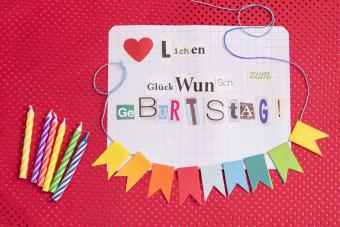
Alles Gute zum Geburtstag is a German birthday greeting that means "Happy Birthday." Herzlichen Glückwunsch zum Geburtstag is another German birthday greeting that translates to "Many happyr eturns!" But if you're moving to or visiting Germany, what popular German traditions can you expect to experience on your birthday and how should you deal with the birthdays of your German friends?
German Birthday Traditions
Germans are thoughtful friends and love to wish each other well on birthdays. However, German birthday traditions may seem a bit strange to someone from North America. Germans are serious about birthdays, have an unusual sense of humor, and expect a lot from the person celebrating their birthday.
Happy Birthday Wishes
In Germany, it's considered "bad luck" to wish a person Alles Gute zum Geburtstag before the day of their birthday. There will be no early birthday cards, gifts, or parties. As a matter of fact, a German will never mention your birthday before your birthday. Even if you give yourself a birthday party the night before your birthday, friends will come but ignore the party's reason until the clock strikes midnight. Then they'll all chime in with happy birthday wishes and gifts.

The Birthday Party Is on You
Friends or family are not likely to throw you a birthday party and foot the bill, so it's all on the person who's having the birthday. It's traditional in Germany for the birthday party to be planned and paid for by the celebrant. Even if you invite friends or co-workers to a restaurant or for drinks to celebrate your birthday, you're expected to pick up everyone's tab.
You Provide the Birthday Cake
It's also German tradition for the birthday boy or girl to provide the birthday cake. At work, the birthday celebrant provides the birthday cake, cookies, or pastries and passes them around to co-workers. Parents bring treats to school for their child's entire class. Even if the individual having the birthday does not see friends, family, co-workers, or classmates on their birthday, it flies in the face of tradition not to give them something after your birthday. For example, if your birthday is on a Saturday, you can bet your German co-workers will be expecting some birthday goodies on Monday.

Weird German Birthday Traditions
These strange and humorous German birthday traditions are practiced in various parts of Germany.
Sixteenth Birthday
In Northern Germany, flour is poured flour on top of the head of a young person on their 16th birthday.
Eighteenth Birthday
It's common in Germany to have eggs cracked on your head on your 18th birthday.
Twenty-fifth Birthday
On the 25th birthday, it's customary for unmarried men and women to have garland strung outside their homes leading to their parties. Men get a garland of socks signifying "old sock," a derogatory term meaning confirmed bachelor. Women get a garland of cartons symbolizing "old box," a derogatory term meaning old maid.
Thirtieth Birthday
In Parts of Germany, if you're 30 years old and single, your friends will give you a drink or two and put you to work with a broom or cleaning cloth on the courthouse steps. They might even make you wear a costume while performing the cleaning tasks to draw attention and let others know that you're 30 years old and still single. A kiss from the opposite sex frees the birthday boy or girl from the task.

German Birthday Candle Traditions
A birthday cake topped with candles isn't a German tradition. However, there is one candle for every year with a larger additional called the "light of life" for good luck. At sunrise, a family member lights the candles, and they remain lit the entire day. For children, the candles are sometimes placed on a beautifully decorated "birthday wreath" made out of wood. A candle for each year is placed around the wreath and a larger good luck candle is placed in the middle.
A German Child's Birthday
Germans are easier on their kids. When a German child has a birthday, they get to celebrate from sun up till sundown. The child is never given chores or homework on their birthday, and it's an all day celebration. Historians say that Germans had the first birthday parties for kids and are responsible for a birthday cake topped with candles. These parties were called Kinderfeste, meaning child festival. A child's day began with being awakened by the delivery of their birthday cake to their bed with the candles already lit. The candles were kept burning all day and only blown out by the child after the families' evening meal. The birthday boy or girl also gets the say what they want for dinner and, of course, they receive birthday gifts.

German Family Birthday Traditions
Germany is a family-oriented country. Regardless of age and distance, the family will have a birthday celebration, if not on the day itself, then as soon as possible afterward. Outsiders are seldom invited to family birthdays celebrations. A popular custom is for family members to composing poems in honor of the birthday celebrant. These poems are often about fond and funny memories that are meant to be as embarrassing as possible to the birthday celebrant. Yes, Germans, both young and old, have a sense of humor and love celebrating birthdays.







